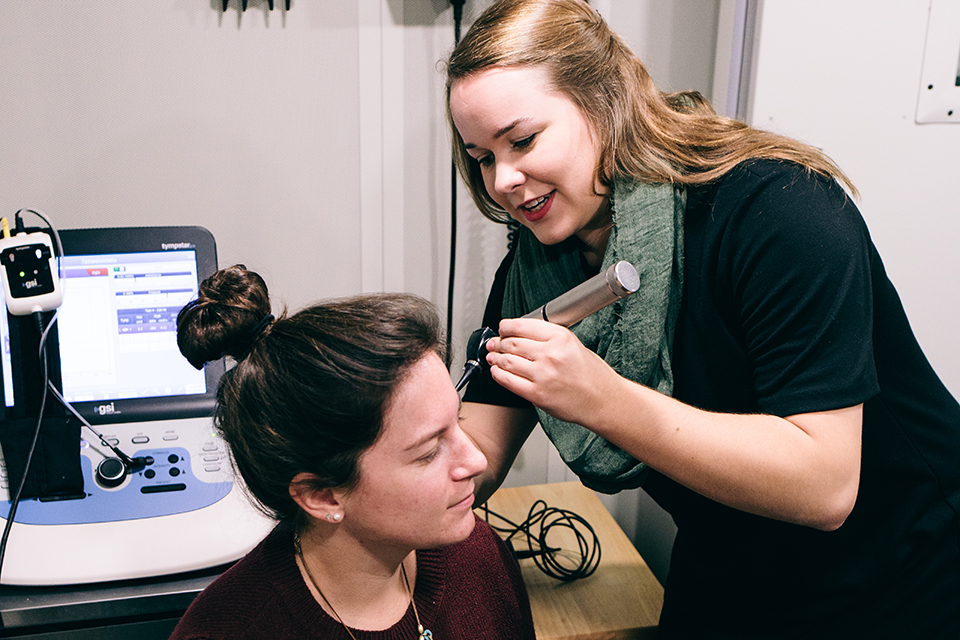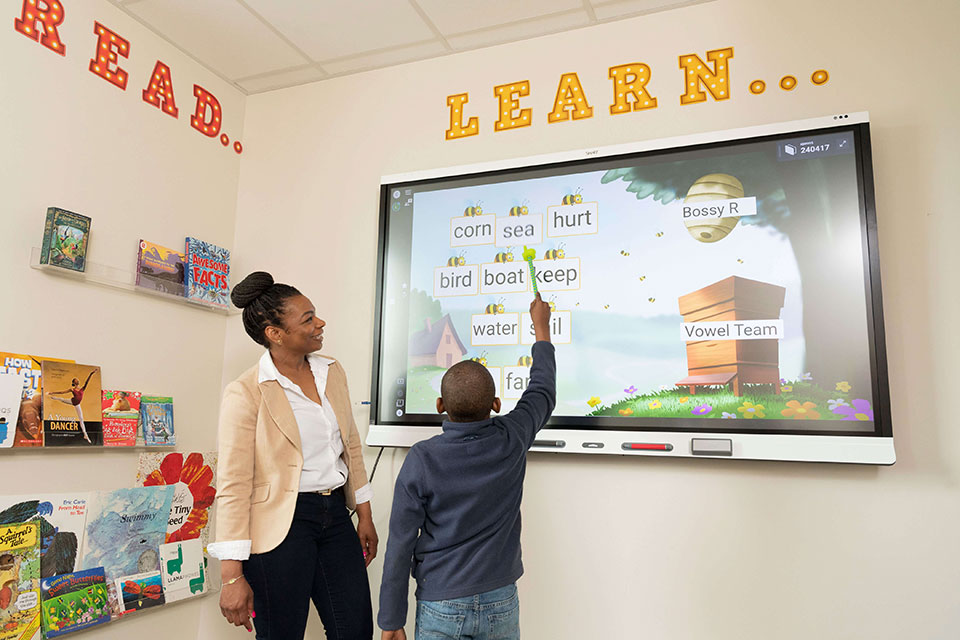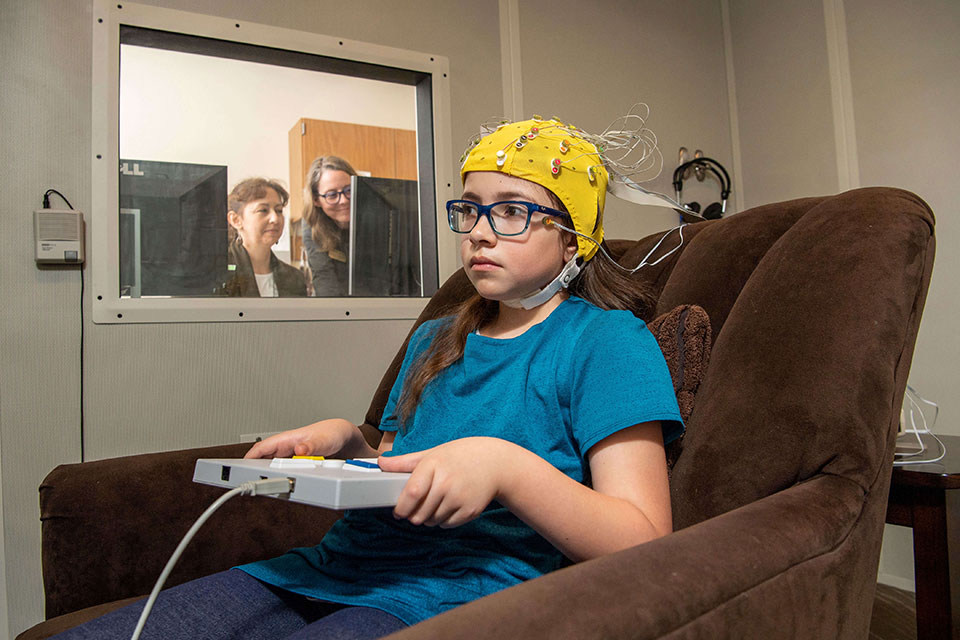
Creating Communication Clarity
With clinical experiences, the Department of Speech, Language, and Hearing Sciences (SLHS) allows you to make a difference in the community, working to treat and prevent a wide range of communication disorders. You’ll also have opportunities to get involved in research with the department’s expert faculty to contribute basic scientific knowledge related to human communication.

Undergraduate Clinical Experience
As an undergraduate or graduate student in the Department of Speech, Language, and Hearing Sciences, you’ll gain insights into real-world applications of speech, language and hearing healthcare in the department’s 31 clinical programs. The SLHS clinics span a wide range of speech, language, hearing, swallowing and balance conditions, providing you with understanding of a variety of approaches for individuals of all ages.
As an undergraduate, you may choose to observe speech-language pathology or audiology appointments as well as provide support for clinical operations. See below for more specific information on how to observe, volunteer, or register for an independent study course (SLHS 49000).

Undergraduate Research Opportunities
Providing the evidence behind clinical practice, SLHS researchers seek to improve scientific understanding of typical and disrupted speech, language and hearing systems and develop therapeutic methods and instruments to prevent or remediate disorders. Undergraduate students interested in research are encouraged to contact individual faculty whose research aligns with their interests. You may receive course credit for your research participation through SLHS 49000 or SLHS 49800. In these courses, you’ll gain experience in data collection, analysis and interpretation as well as scientific writing.
Participating in research will not only help you determine if you want to pursue research in your career but also allow you to develop contacts for recommendation letters and enhance the competitiveness of your graduate school application.
Current SLHS 49000/49800 Position Announcements
Lab Openings for Spring 2024:
- Arielle Borovsky (LLaMA Lab Application Form)
- Brandon Keehn (AtteND Lab Application Form)
- Jiyeon Lee (Aphasia Lab Application Form)
Lab Openings for Summer 2024:
- Joshua Alexander (Experimental Amplification Research Lab)
- Alex Francis (Research on hearing and balance) – must be available on campus
- Brandon Keehn (AtteND Lab Application Form)
- Arianna LaCroix (Acquired Brain Injury Communication and Cognition (ABC) Lab)
- Jiyeon Lee (Aphasia Lab Application Form)
- Laurence Leonard (Child Language Lab) – Summer Fun
- Georgia Malandraki (I-EaT Lab Application Form)
- Natalya Kaganovich (Auditory Cognitive Neuroscience Lab requirements)
- Amanda Seidl
Lab Openings for Fall 2024:
- Joshua Alexander (Experimental Amplification Research Lab)
- Arielle Borovsky (LLaMA Lab Application Form)
- Brandon Keehn (AtteND Lab Application Form)
- Ravi Krishnan (Auditory Electrophysiology Lab)
- Arianna LaCroix (Acquired Brain Injury Communication and Cognition (ABC) Lab)
- Jiyeon Lee (Aphasia Lab Application Form)
- Georgia Malandraki (I-EaT Lab Application Form)
- Amanda Seidl (Purdue Infant Speech Lab)
Experiential Learning Testimonials
Addy Kolb
Speech, Language, and Hearing Sciences
Addy Kolb
Speech, Language, and Hearing Sciences
As a senior SLHS student, I am thankful for all the unique experiences that I have been able to participate in during my time at Purdue. Two experiences that especially stand out to me are my participation in an SLHS research lab and being a study abroad student in Spain. I have been a part of Dr. Shader’s Brain Research in Auditory Neuroscience (BRAiN) lab since my sophomore year. This experience has been so beneficial to me, as I was able to get hands-on experience, work with a great research team, learn so much about cochlear implants and how research is conducted, along with solidifying my decision to pursue an Audiology degree! In the Spring 2024 semester, I went to Madrid, Spain with the WIP study abroad program to fulfill my Spanish minor, along with having the unique experience of living, traveling and studying abroad. This was such an amazing opportunity that I highly recommend it to anyone who can do it! I am so thankful to Purdue and the SLHS program for giving me these opportunities, along with many more. Comparing my senior year self to my freshman year self, I can truly see how much I have grown academically and personally, thank you Purdue!
Abby DePaul
Speech, Language, and Hearing Sciences
Abby DePaul
Speech, Language, and Hearing Sciences
I have really enjoyed being involved in the ABC Lab, and it has had a large impact on my undergraduate experience. I have had the opportunity to see research in action and work closely with Dr. LaCroix and other SLHS students who have served as great resources for me in and out of the lab. I have gained important research skills that will help me in my future career as a Speech-Language Pathologist, as well as opportunities to share research within the College of Health and Human Sciences.
Studying abroad was also an impactful experience, as it allowed me to be immersed in another culture. It was rewarding to see how communication and language are different from country to country. After being a part of the language minority in this country, I feel I have a greater understanding of how important true communication is. I can use this experience in my future work as a Speech-Language Pathologist!
Jill Robbins
Speech, Language, and Hearing Sciences
Jill Robbins
Speech, Language, and Hearing Sciences
Entering the SLHS program at Purdue has given me countless opportunities for professional growth and learning. One of these opportunities was the National Student Speech Language Hearing Association (NSSLHA), a professional development club for anyone pursuing a career in SLHS; it is an incredible way to network with people in SLHS, doing a great job of showing students what it is like to be a professional in SLHS. After my freshman year, I was elected to a leadership role as the ISHA Liaison. From this role, I have gained powerful leadership, organizational, and communication skills. I have also developed skills through participating in research. During summer 2024, I was a research assistant for the Child Language Lab during their Summer Fun program. Through involvement in this research, I learned more about how children with developmental language disorders learn language. To further my research experience, I have recently joined the Child Phonology Lab. Both research experiences have taught me about how knowledge in our field is acquired. Alongside research, the department provides undergraduates the opportunity to observe clinical sessions, allowing me to learn about many areas within speech-language pathology. Observing aphasia, literacy, and pragmatic clinics helps me gain a greater understanding of what it means to be a practicing SLP. I believe that all these experiences are preparing me for my future and will make me a better speech-language pathologist.